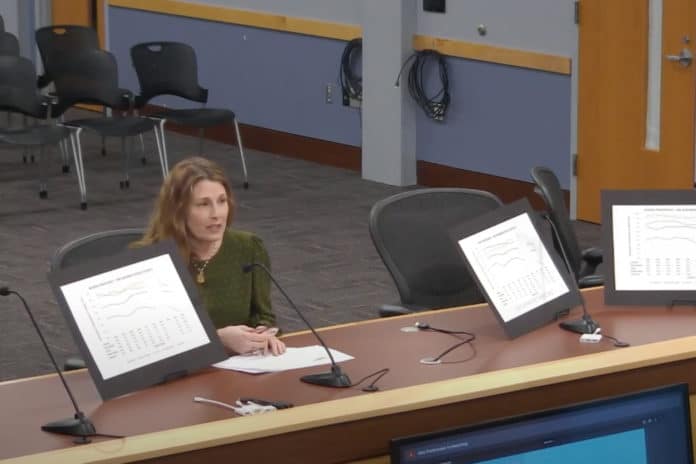
A former educator at Hopkins Public Schools confronted the school board last week over the district’s apparent failure to act on a serious decline in student test scores.
Michon Ross, a Hopkins resident and former paraprofessional, took part in the public comment portion during last Tuesday’s board meeting to share her concerns about test scores and a lack of follow-up from the district.
The mother of two teachers herself criticized the district for providing a “litany of excuses” for the test scores decline, instead of the “solutions” she had asked for at another board meeting months earlier.
“Perhaps this lack of academic focus is why more than 1,000 students from the Hopkins district chose to open enroll in Minnetonka Public Schools this year, which the data suggests the number one reason for moving to a neighboring district is the pursuit of stronger academics,” said Ross.
Ross pushed back against the notion that the COVID pandemic was primarily responsible for the decline in test scores, pointing out that the problem goes back at least a decade.
Data from the Minnesota Department of Education (MDE) reveals a significant drop-off in grade-level math, reading, and science proficiency of Hopkins students since 2013. That year, 62% of students were considered proficient in math, 63.4% in reading, and 51.4% in science, according to data from MDE that she presented to the board.
In 2022, however, just 41.8% were proficient in math, 51.9% in reading, and 35.3% in science — by far the lowest group of test scores and the sharpest declines among the major school districts in the southwest suburbs of Minneapolis, which includes Eden Prairie, Edina, Minnetonka, and Wayzata public schools.
Ross took issue with the interpretation of the data by district-funded education consultants, one of whom claimed that average math and reading scores just below 40% “meets target” for adequate proficiency.
“My question for the board, and to the consultants that our tax dollars paid for, is simply this: In what world [do] math scores of 35% ‘meet target’?” said Ross. “We all know in this room that that’s not true.”
A Hopkins school board member came under fire from parents last October after writing on Nextdoor that Minnesota Comprehensive Assessment (MCA) tests were “meaningless.”
“Minnesota Comprehensive Assessment (MCA) tests are a meaningless indicator of school district quality,” said board member Steven Adams. “Colleges don’t consider them in evaluating applicants. Employers don’t consider them in evaluating potential employees. In-depth studies have determined that standardized tests only correlate to family income. Is it any wonder, then, that the school districts with [the] highest family income score best on the MCA tests?”















